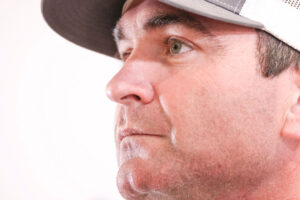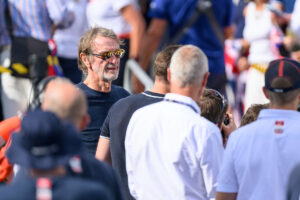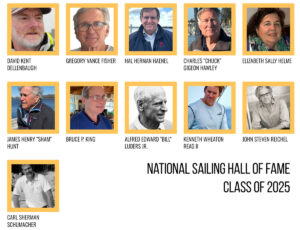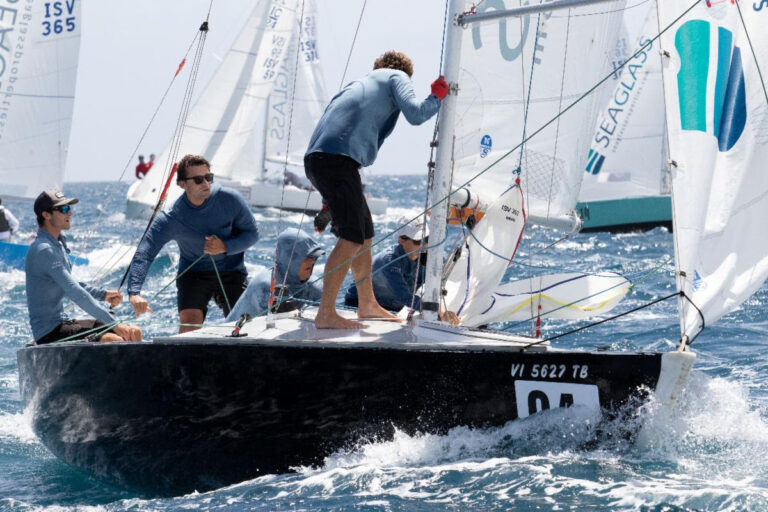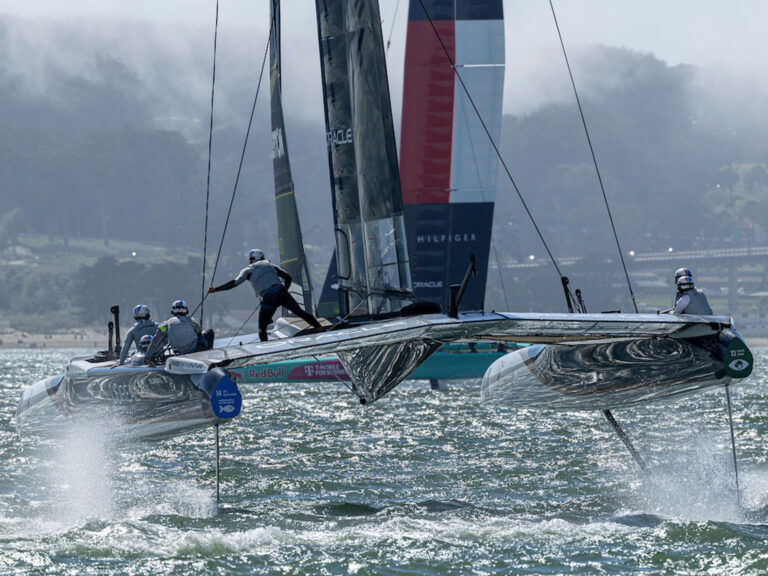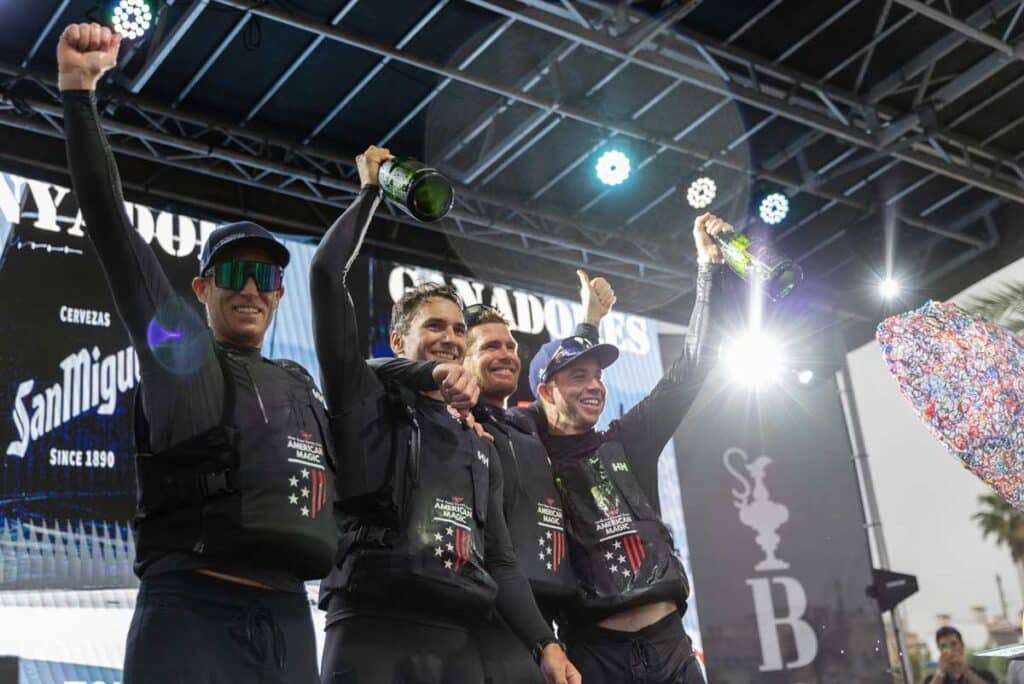
There will be many armchair takeaways from the first of the 37th America’s Cup Preliminary Regattas, held in the one-design AC40s owned by each of the five teams, but the most poignant and obvious is that no matter the technical complexities inside these 40-foot foilers, once the flying stops it’s race over.
The undeniable priority of continuous flight from the pre-start to the finish line was on full display at this first showcase event of the AC37 cycle. Here, on the waters off the Spanish beaches of Vilanova i La Geltrú, a short drive down the coast from the AC epicenter of Barcelona, the Cup’s challengers and defender alike faced an unfriendly weather scenario that canceled practice races and then tested the low-wind range potential of these AC40s. Even with batteries, hydraulic systems, autopilots and top-shelf crews, there’s no getting around the limitations that come at the scary bottom of the 6.5-knot wind limit.
This much was revealed on the first official day of racing where chase boat tow-in strategies pre-determined the outcome of the start. Tenders with roaring outboards whipped their steeds into position like tow-in big-wave surfers, spiking their tow lines seconds before the three-minute warning signal. Once released it was all on for the helmsmen and sail trimmers to keep their respective boats clear of the water, each boat’s traveler system getting a serious workout to balance the boats at low speeds.
The first official AC40 race revealed at least two approaches from the light-wind starting playbook. One was demonstrated by the New York YC’s American Magic and Luna Rossa Prada Pirelli, both of whom employed impressive and well-timed dip-starts. No one else was remotely close to or below the line to prevent such a move, so it was a safe and smart bet that appeared to work brilliantly until the race committee dinged the Italians with an OCS penalty, stating that starboard helmsman Jimmy Spithill had failed to get the windward foil fully below the line.
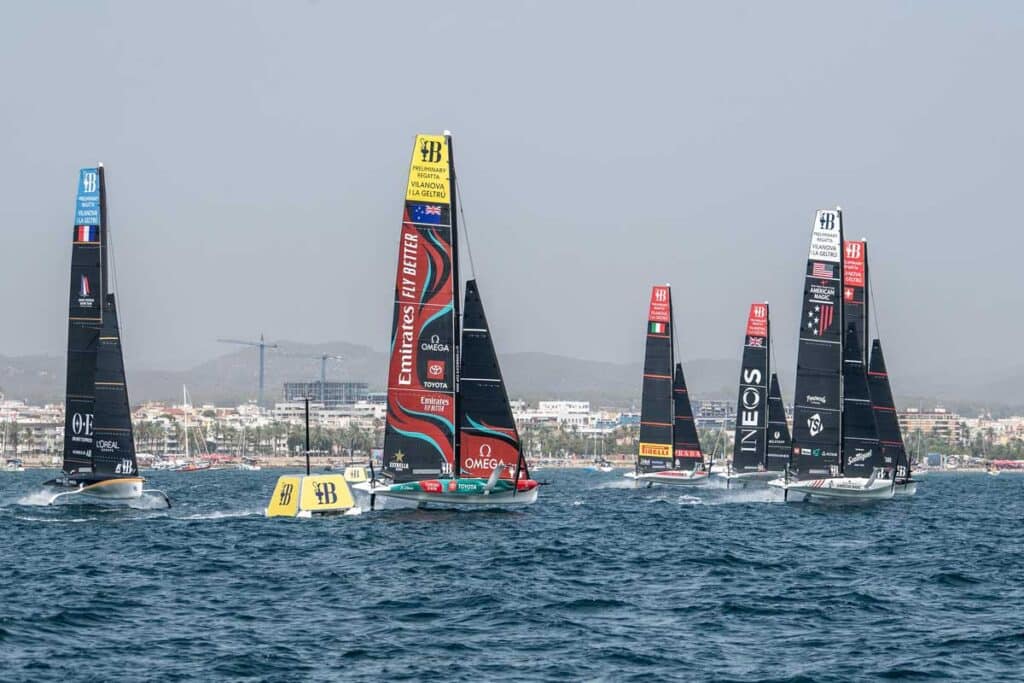
Meanwhile, American Magic, with Tom Slingsby and Riley Gibbs in the starboard cockpit and Paul Goodison and Michael Menninger in the port cockpit, essentially won the start to check that box. The other approach was demonstrated by the French of Orient Express Racing Team France, which ducked the on-time starters on port tack, hit the starboard boundary and led around the course, eventually drifting across the finish line to win the shortened two-leg race.
Spithill and his offside equal Francesco Bruni were plenty confident they were well below the line and argued their OCS was a mistake of the race management software. By the following morning their redress request was honored and they were given a second-place finish and seven points.
Third across the finish line in Race 1, American Magic collected 5 points to sit third in the standings. Not ideal, but far better than that of Emirates Team New Zealand or INEOS Britannia at the back of the fleet.
With wind enough to get a second race start underway, the race committee set the clock at 3 minutes and when the starting horn sounded, the majority of the fleet struck the line stuck to the water. Alinghi Red Bull Racing came late on a long approach, but riding high on the port foil they creamed past the fleet which was virtually at a standstill.
While the race appeared all but over when Alinghi Red Bull Racing put itself nearly a leg ahead, Emirates Team New Zealand somehow got itself unstuck to finally give a modicum of chase to the Swiss. With a single failed jibe near the bottom of the course, however, Alinghi too fell victim to woes of displacement sailing and the New Zealanders did a masterful job of staying on foil to snatch the win. With the wind dying altogether and the time limit expiring, all others were given their place and sent packing with the French newcomers atop the scoreboard.
The following day and slightly more wind brought a better promise of what close-combat AC40 racing would look like and expectations were high in the first race when American Magic and Emirates Team New Zealand started at the starboard end of the line in lock step. The two rivals played cat and mouse up the first leg, both demonstrating the power of a properly executed lee-bow tack, which in marginal winds seems to be an effective way to force an opponent into a down-speed tack. American Magic and Emirates Team New Zealand went at each other until the New Zealanders were finally able to streak away and take the race win handily.
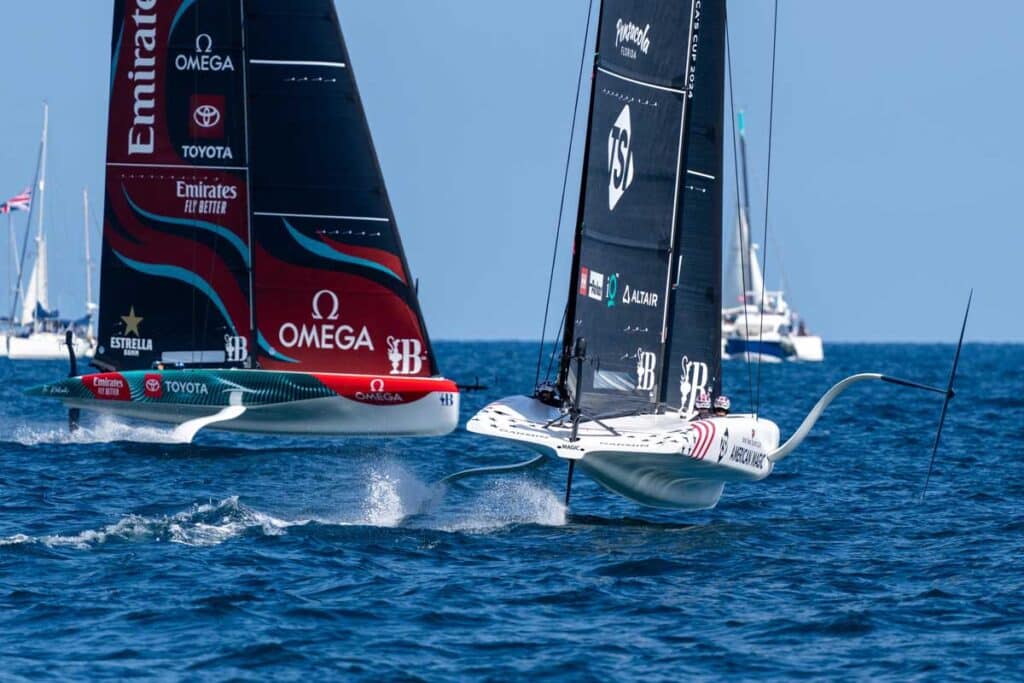
American Magic once again nailed its time and distance in the following start (Race 4) and once they were able to shed the New Zealanders off their weather hip it was their racecourse to control. The New Zealanders promptly found themselves being pin-balled around the course and fourth was the best they could manage.
In the fourth and final fleet race, Emirates Team New Zealand and American Magic each had keeper starts. The New Zealanders got the early jump on the fleet and appeared to be running away with the race win before flubbing a jibe and springing the Americans into the lead, a position they would never relinquish. Team New Zealand staged an impressive comeback that set up the American and New Zealand match-race finale.
With the sun hanging low over the Mediterranean racecourse, however, what was already a fading and marginal sea breeze rapidly faded and brought an end to the foiling action. With both teams crossing the line in displacement mode, and the New Zealanders already stuck with multiple pre-start penalties, it was a drift-off of which the New York YC’s American Magic was firmly in control. Try as they might to muscle their boats onto the foil, the boats remained stuck, the 10-minute first-leg time limit expired and there was no more match to win.
As the team atop the scoreboard, American Magic secured its first preliminary regatta win, sprayed the obligatory champagne and toasted their success with cold cervezas from Mahou, the team’s new beer sponsor. Not long after, they were straight back to work in Barcelona for the America’s Cup waits for nobody.
Sentiments across the fleet is that Team New Zealand remains a formidable foe for all challengers, and the French, third overall in Vilanova, had its act together despite the least amount of time in its AC40. Alinghi Red Bull Racing was a true spoiler and plenty fast until a regatta-ending hydraulic issue forced them to the sidelines of the final fleet race.
And from the camp of INEOS Britannia, last in every race by a lot, there were candid words from team boss and helmsman Ben Ainslie. “We didn’t sail well, we didn’t put enough time in the boat and there were some other underlying issues in terms of our preparation time in the boat so you put those three together, maybe we shouldn’t be surprised with the result,” he said after racing. “But [with] any professional sporting team it’s not okay to finish last.”

